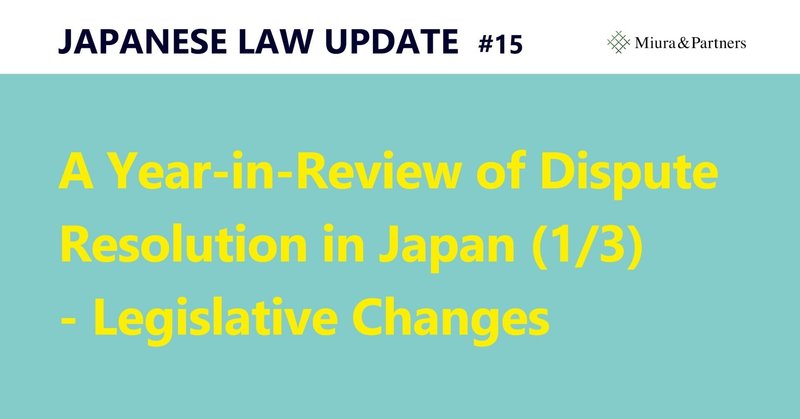
Japanese Law Update #15: A Year-in-Review of Dispute Resolution in Japan (1/3) - Legislative Changes
2023 has seen significant developments in the dispute resolution landscape in Japan. This article covers legislative changes in litigation, arbitration, and mediation as well as the developments in judicial decisions by the Japanese courts.
Related Articles
Japanese Law Update #16: A Year-in-Review of Dispute Resolution in Japan (2/3) - Case Developments
Japanese Law Update #17: A Year-in-Review of Dispute Resolution in Japan (3/3) - ESG Litigation
1. E-Litigation is finally available in Japan
In 2023, some e-litigation has become available in Japan. The Code of Civil Procedure of Japan was reformed in 2022 (the “Reform”). The Reform aims to implement e-litigation and a fast-track procedure in Japan. In principle, e-filing and online hearings were not available in Japan. The litigants had to make their written submissions to the courts by hand, post, or fax. The Reform is expected to take full effect by 2026 in several phases. The Reform is expected to make court proceedings more flexible, expeditious, and cost-effective.
The Reform introduces e-filing as the new standard procedure. The courts will use a new online platform. The Reform requires parties to submit their complaint or other written submissions to the court online if the party is represented by counsel. The Reform also requires the courts to serve documents to the parties online if the party is represented by counsel.
Once the Reform fully comes into force, the litigants and their counsel will be able to participate in oral arguments, including witness hearings and proceedings for settlement, via a web conferencing system. The Reform allows court hearings to be held online without needing both parties and their counsels to appear physically before the court. As of 2023, the relevant part of the Reform regarding proceedings for online settlement and preparatory proceedings has already come into force.
The new online case records, which will be implemented as part of the Reform, will store, among other things, the written submissions of the litigants, the records of court hearings, and judgments in an online database. The e-records will enable the litigants of the case and interested parties (who are allowed to obtain a copy of the case records) to access them online. A government advisory committee is discussing whether civil court judgments could be made available as open data.
2. Fast-Track Procedure in Litigation
There has not been a standard time limit for reaching a judgment in civil procedure in Japan. The Reform also establishes a fast-track procedure (FTP), whereby the court decides within a certain statutory period, if both parties wish to do so. When the parties choose to proceed under the FTP, the court shall conclude oral arguments within six months of the date of the first hearing, and render a judgment within one month of the date of conclusion of the oral arguments. The FTP enables court proceedings to be concluded in a much shorter timeframe.
3. The Reform of the Arbitration Act
In 2023, the revision of the Arbitration Act finally passed at the Diet. The reform of the Act will empower Japanese courts to recognize and enforce interim measures issued by arbitral tribunals. Currently, a party enforcing an arbitral award in a foreign language must provide the court with a Japanese translation of the award. The reform also enables the Japanese courts to enforce awards without a Japanese translation at their discretion.
4. Japan will become the Party of the Singapore Convention
With the launch of the United Nations Convention on International Settlement Agreements Resulting from Mediation (the “Singapore Convention”) in 2020, international mediation as a means for dispute resolution is also attracting increasing attention in Japan. In October 2023, Japan submitted the instrument of accession to the Singapore Convention. Japan will become a contracting party to the Convention on April 1, 2024. A related, newly passed act on mediation includes an enforcement process for settlement agreements resulting from international mediation before Japanese courts.
These legislative changes reflect an effort by the Japanese government to enhance Japan’s reputation as a favorable seat for international dispute resolution.
Authors
Yoshie Midorikawa, Partner
Yoshie Midorikawa has extensive experience in complex disputes and arbitration. Having worked with leading law firms in Japan and Singapore, she has handled parallel proceedings across multiple jurisdictions as well as domestic disputes before Japanese courts. She has also served as a board member of listed companies in Japan, improving their corporate governance. Her deep understanding of the civil law system, her working experience in international environments, including common law jurisdictions, and her knowledge of business, enable her to bring practical and nuanced legal solutions to international businesses. She is listed among “Next Generation Partners (Dispute Resolution)” by Legal500 Asia Pacific 2023, “Best Lawyers in Japan (Litigation)” in the editions of 2021 to 2024, “Best Lawyers in Japan (Corporate Governance & Compliance)” in the edition of 2023 and 2024, “Best Lawyers in Japan (International Arbitration)” in the edition of 2024 by Best Lawyers.
Shunsuke Ebihara, Associate
Shunsuke Ebihara handles a wide range of corporate matters, focusing on commercial litigation, dispute resolution, corporate crisis management, and white-collar crime. After graduating from Waseda University School of Law, he worked in the Public Prosecutor’s Office as a public prosecutor and for a major law firm in Japan.
Daichi Ito, Associate
Daichi Ito handles a variety of cases including structured finance, real estate transactions, capital markets, corporate law and dispute resolution. After starting his career as a lawyer, he worked for a major law firm in Japan and is seconded to Slaughter and May in Hong Kong.
この記事が気に入ったらサポートをしてみませんか?
